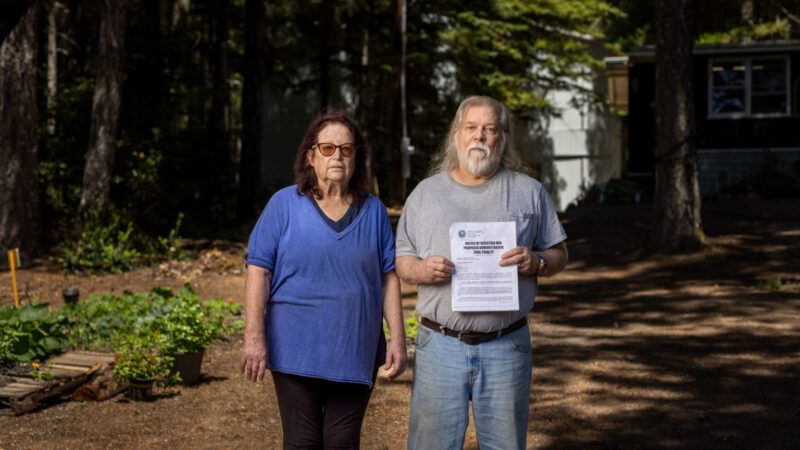They Face $1 Million in Fines—for Someone Else's Code Violations
Humboldt County, California's sketchy code enforcement scheme piles ruinous fines on innocent people and sets them up to lose.

A California couple is staring down stratospheric fines after their property allegedly ran afoul of local cannabis code violations. The kicker, however, is that the previous owner is to blame for the infractions.
That has not deterred Humboldt County, California, from levying $1 million in civil penalties against Corrine and Doug Thomas, who bought the home in the Northern California redwood forest after their home in Los Angeles County was destroyed by a wildfire. Six days after moving in, the government sent the property a notice—addressed to the former owner, Summerville Creek LLC—outlining violations pertaining to a structure in the Thomas' backyard. According to court documents, that included "violation of the commercial cannabis land use ordinance; construction of a building or structure in violation of building, plumbing, and electrical codes; and, facilities or activities in violation of the commercial cannabis land use ordinance."
The county assessed penalties at $12,000 a day for up to 90 days. To circumvent that, the couple would have to demolish the problematic structure in question, which would cost them $180,000, plus fines and fees. The couple appealed. But per county policy, the fines pile up while they wait for a hearing, which can take years. After a 10-day window, the 90-day clock starts, with penalties ballooning as time goes by.
So how does the county know who has allegedly broken the law? "Humboldt implemented a system to enforce cannabis-permitting violations that relies primarily on grainy satellite images," wrote attorneys for Thomas in a writ of certiorari to the Supreme Court. The effort, they say, is part of the government's desire to cash in on cannabis after the state legalized the drug.
"Code-enforcement officers scour the images for what looks like unpermitted development on a property (e.g., a greenhouse, a building, a graded flat of land, or trees removed without a permit on record)," they write. "The County then presumes, without any evidence or further investigation, that the landowner must have developed their property without a permit because they were growing cannabis. In Humboldt's view, there's just no other reason that someone might not buy a permit before building a shed, a barn, or a greenhouse in the rural countryside."
In that vein, the Institute for Justice, a public interest law firm, is also representing Blu Graham, who was hit with fines for cannabis-related violations when he says the only thing he's ever grown on his property are vegetables for his restaurant; as well as Rhonda Olson, who faces $7.4 million in fines—also for a previous owner's conduct—on a $60,000 property she bought to develop housing.
Most recently, the plaintiffs asked the Supreme Court to reconsider one of the major roadblocks to achieving a just outcome in Humboldt County: the Seventh Amendment right to a jury trial in civil cases, which the government is not providing here, and which the Supreme Court long ago ruled is not enforceable against the States. Instead, the government conducts administrative hearings, where the odds are grim.
The Court this month declined to intervene, though Justice Neil Gorsuch released a statement urging that the justices should consider the issue at some point down the line. "Surely, those who founded our Nation," he wrote, "considered the right to trial by jury a fundamental part of their birthright." Meanwhile, the plaintiffs' fight will continue in the lower court after the U.S. Court of Appeals for the 9th Circuit revived the suit late last year citing the Eighth Amendment, which prohibits excessive fines and fees.


Show Comments (29)